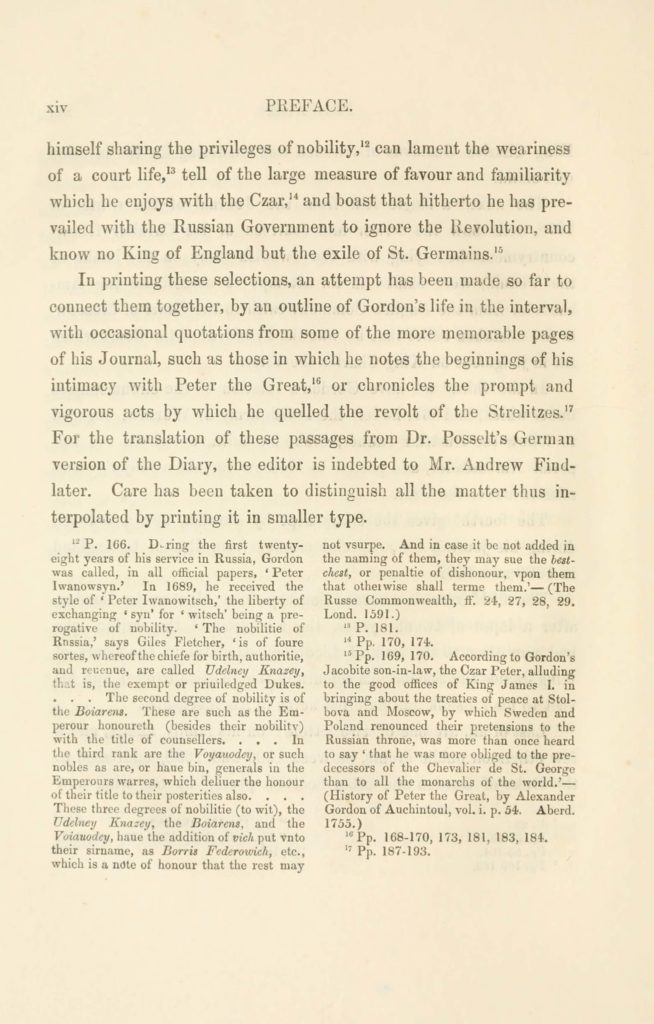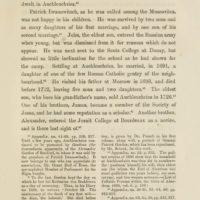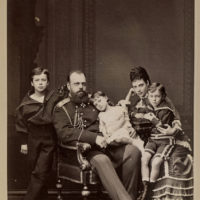
Related

PREFACE. xxi grave, his grandson was a landless man, and another race of Gordons dwelt in Auchleuchries

Emperor Alexander I and his great predecessors. The feat of the 300-year service of Russia by the princes of the House of Romanovs.

Emperor Alexander I with his wife Empress Elizaveta Alekseevna

Император Александр III с семьей в Собственном садике Большого Гатчинского дворца

His Imperial Highness The heir to the Russian throne Tsesarevich Nikolai Alexandrovich with the sister of the Grand Duchess Ksenia Alexandrovna.

PREFACE. xvii sixpence a-day ;^^ and that the northern nobles, from the Duke of Gordon downwards

Alexander III, the Emperor of Russia with wife and kids

Sacred coronation of the Emperor Alexander III

Sacred coronation of the Emperor Alexander III
xiv PREFACE. himself sharing the privileges of nobility,'^ can lament the weariness of a court life,^^ tell of the large measure of favour and familiarity which he enjoys with the Czar,
Summary
Passages from the diary of General Patrick Gordon of Auchleuchries : A.D. 1635-A.D. 1699"
xiv PREFACE.
himself sharing the privileges of nobility,'^ can lament the weariness
of a court life,^^ tell of the large measure of favour and familiarity
which he enjoys with the Czar,^* and boast that hitherto he has pre-
vailed with the Russian Government to ignore the Revolution, and
know no King of England but the exile of St. Germains.'^
In printing these selections, an attempt has been made so far to
connect them together, by an outline of Gordon's life in the interval,
with occasional quotations from some of the more memorable pages
of his Journal, such as those in which he notes the beginnings of his
intimacy with Peter the Great,'^ or chronicles the prompt and
vigorous acts by which he quelled the revolt of the Strelitzes.'^
For the translation of these passages from Dr. Posselt's German
version of the Diary, the editor is indebted to Mr. Andrew Find-
later. Care has been taken to distinguish all the matter thus in-
terpolated by printing it in smaller type.
^^ P. 166. D-ring the first twenty- not vsurpe. And in case it be not added in
eight years of his service in Russia, Gordon the naming of them, they may sue the hest-
was called, in all official papers, ' Peter chest, or penaltie of dishonour, vpon them
Iwanowsyn.' In 1689, he received the that otheiwise shall terme them.' — (The
style of * Peter Iwanowitsch,' the liberty of Russe Commonwealth, ff. 24, 27, 28, 29.
exchanging ' syn' for ' witsch' being a pre- Lond. 1591.)
rogative of nobility. ' The nobilitie of " P. 181.
Rnssia,' says Giles Fletcher, 'is of foure '* Pp. 170, 174.
sortes, whereof the chiefe for birth, authoritie, '° Pp. 169,170. According to Gordon's
and reuenue, are called TJdelney Knazey, Jacobite son-in-law, the Czar Peter, alluding
that is, the exempt or priuiledged Dukes. to the good offices of King James I. in
. . . The second degree of nobility is of bringing about the treaties of peace at Stol-
the Boiarens. These are such as the Em- bova and Moscow, by which Sweden and
perour honourcth (besides their nobilitv) Poland renounced their pretensions to the
with the title of couusellers. ... In Russian throne, was more than once heard
the third rank are the Voyauodey, or such to say ' that he was more obliged to the pre-
nobles as are, or haue bin, generals in the decessors of the Chevalier de St. George
Emperours warres, which deliuer the honour than to all the monarchs of the world.' —
of their title to their posterities also. . . . (History of Peter the Great, by Alexander
These three degrees of nobilitie (to wit), the Gordon of Auchintoul, vol. i. p. 34. Aberd.
TJdelney Knazey, the Boiarens, and the 1755.)
Voiauodey, haue the addition of vich put vnto "* Pp. 168-170, 173, 181, 183, 184.
their sirname, as Borris Federowich, etc., '' Pp. 187-193.
which is a ndte of honour that the rest may
Gordon was brought up and remained a lifelong Roman Catholic, at a time when the Church was being persecuted in Scotland. At age of fifteen, he entered the Jesuit college at Braunsberg, East Prussia, then part of Poland. In 1661, after many years experiences as a soldier of fortune, he joined the Russian army under Tsar Aleksei I, and in 1665 was sent on a special mission to England. After his return, he distinguished himself in several wars against the Turks and Tatars in southern Russia. In recognition of his service he was promoted to major-general in 1678, was appointed to the high command at Kiev in 1679, and in 1683 was made lieutenant-general. In 1687 and 1689 he took part in expeditions against the Tatars in the Crimea, being made a full general. Later in 1689, a revolution broke out in Moscow, and with the troops under his command, Gordon virtually decided events in favor of Peter the Great against the Regent, Tsarevna Sophia Alekseyevna. Consequently, he was for the remainder of his life in high favor with the Tsar, who confided to him the command of his capital during his absence from Russia. In 1696, Gordon's design of a "moveable rampart" played a key role in helping the Russians take Azov. One of Gordon's convinced the Tsars to establish the first Roman Catholic church and school in Muscovy, of which he remained the main benefactor and headed the Catholic community in Russia until his death. For his services his second son James, brigadier of the Russian army, was created Count of the Holy Roman Empire in 1701. At the end of his life the Tsar, who had visited Gordon frequently during his illness, was with him when he died, and with his own hands closed his eyes. General Gordon left behind him a uniquely detailed diary of his life and times, written in English. This is preserved in manuscript in the Russian State Military Archive in Moscow. Passages from the Diary of General Patrick Gordon of Auchleuchries (1635–1699) was printed, under the editorship of Joseph Robertson, for the Spalding Club, at Aberdeen, Scotland, 1859.
